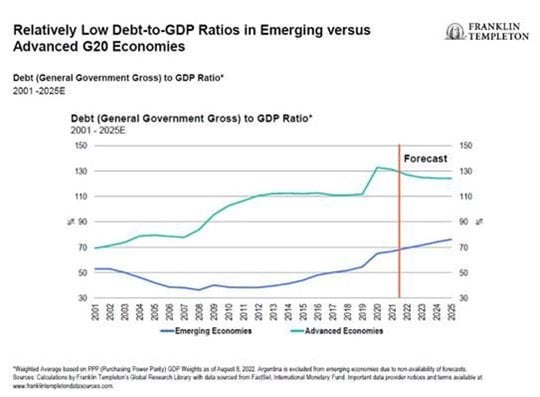
Related
Top stories





Marketing & MediaWarner Bros. was “nice to have” but not at any price, says Netflix
Karabo Ledwaba 2 days

More news

Logistics & Transport
Maersk reroutes sailings around Africa amid Red Sea constraints

















Global economies have faced a number of challenges in recent months, leading to depressed stock market returns. The ongoing Russia-Ukraine war continues to have ripple effects on the global economy. And although most countries have gone back to business as usual following the peak of the Covid-19 pandemic, the virus is probably not going to fully disappear. In addition, China’s “Zero-Covid” policy has been weighing on economic activity there. Other well-known market challenges include rising inflation and interest rates, as well as the surging US dollar.
Despite these headwinds, emerging economies continue to prove their resilience. Now is a compelling time to consider emerging markets equities, even as many investors are less focused on the asset class.
Policies in emerging markets have generally been more conventional and consistent than those of developed markets and will ultimately lead to more robust economies relative to their own history and relative to developed markets. In contrast to developed markets in the post-global financial crisis period, emerging economies did not experiment with negative interest rates. They have generally had upward-sloping, traditional yield curves over the past decade.
During the recent pandemic, policymakers in emerging markets generally did not pursue very aggressive fiscal support plans, which means they did not blow up their sovereign balance sheets. Contrast this with developed markets like the United Kingdom, for example, which pursued aggressive fiscal expansions.
As inflation began to accelerate post-pandemic, emerging economies were also pre-emptive in tightening interest rates. Thus, while the United Kingdom, the Eurozone and the United States are still trying to catch up with rising inflation, many emerging economies have largely completed their tightening cycles.
Brazil, for example, started tightening in March 2021, and has made 12 consecutive rate hikes. Inflation has been decelerating there in recent months, leading the central bank to pause its hiking cycle in September. The US Federal Reserve, meanwhile, did not start raising rates until March of 2022.
In addition, emerging economies are typically less leveraged at the sovereign, corporate and household levels. For example, in Mexico, the household debt-to-gross domestic product (GDP) ratio is only 16%, compared with the United Kingdom’s ratio of around 90%.

At the stock level, emerging markets offer investors opportunities in high-quality and high-growth companies. They are home to some of the most innovative, technology-oriented companies in the world - companies that are building the digital architecture around us. These include hardware and software suppliers as well as semiconductor manufacturers. Some are even responsible for the transition to decarbonisation. Many emerging market companies are global leaders in the production of electric vehicles and electric batteries, and in renewable energy such as in solar manufacturing.
Emerging market equity valuations are trading at near historic discounts versus the developed world. In Franklin Templeton’s analysis, the relative profitability between these two asset classes does not warrant the current 45% discount on a price-to-book basis.
Also, relative to its own 15- to 20-year history, emerging markets as an asset class is one of the few that looks affordable. The MSCI Emerging Markets (EM) Index, a benchmark representing the asset class, is now trading at close to 10 times forward earnings, compared to around 18 times for the US S&P 500 Index (S&P 500).
Emerging market companies have recently been increasing their dividends. They have been using their cash flows to distribute dividends to shareholders rather than deploying capital given uncertain growth outlooks. Company managements have also been seeing value in their equities, resulting in increased buyback activity.
According to Franklin Templeton, these increases are temporary. In this volatile environment, these dividends and buybacks are appreciated, but investment solutions provider would prefer companies invest in their own businesses for secular growth opportunities.
Considering the persistence of high dividend levels is unlikely to remain at the current 4% level, there has been a sea change in how emerging market companies think about capital optimisation and balance sheet management. Over the past 20 years, approximately 2.5% of annualised total returns of 9% have come from dividends. Thus, there has been dividend support to the asset class, which many investors may not realize.
Over the long term, Franklin Templeton is increasingly optimistic about emerging market economies. Despite the current environment of slowing growth, rising inflation and geopolitical issues globally, the investment solutions provider has confidence in both the emerging markets asset class and its strategies continue to seek high-quality business with solid balance sheets, competitive advantages and attractive valuations.
All investments involve risks, including the possible loss of principal. The value of investments can go down as well as up, and investors may not get back the full amount invested. Stock prices fluctuate, sometimes rapidly and dramatically, due to factors affecting individual companies, particular industries or sectors, or general market conditions. Special risks are associated with foreign investing, including currency fluctuations, economic instability and political developments.
Investments in emerging markets involve heightened risks related to the same factors, in addition to those associated with these markets’ smaller size and lesser liquidity. To the extent a strategy focuses on particular countries, regions, industries, sectors or types of investment from time to time, it may be subject to greater risks of adverse developments in such areas of focus than a strategy that invests in a wider variety of countries, regions, industries, sectors or investments.
China may be subject to considerable degrees of economic, political and social instability. Investments in securities of Chinese issuers involve risks that are specific to China, including certain legal, regulatory, political and economic risks.
Franklin Templeton and its specialist investment managers have certain environmental, sustainability and governance (ESG) goals or capabilities; however, not all strategies are managed to “ESG” oriented objectives.